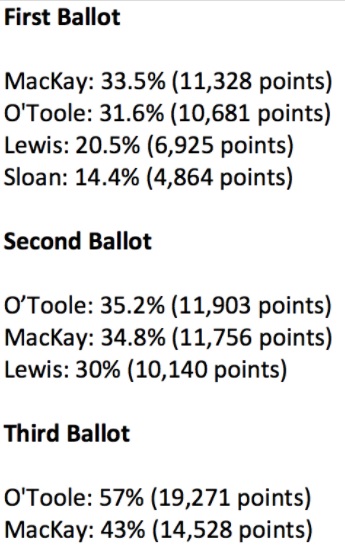After multiple delays, spanning over seven and a half hours, Erin O’Toole was finally announced as the new leader of the Conservative Party of Canada.
And while I had plenty of time to write up four posts during the wait, after the numbers came in, my focus changed. Initially, I had O’Toole pegged as the one who would be least likely to struggle with party unity – until I really looked at the numbers.
| First Ballot | Red Tory | True Blue | SocialCons |
| MACKAY | O’TOOLE | LEWIS+SLOAN | |
| BC | 1281 | 1255 | 1664 |
| NL | 282 | 240 | 179 |
| AB | 826 | 1084 | 1489 |
| NS | 710 | 142 | 248 |
| NT/NWT/YU | 111 | 65 | 124 |
| PEI | 206 | 55 | 139 |
| SK | 224 | 369 | 806 |
| NB | 533 | 153 | 314 |
| MB | 414 | 373 | 613 |
| QC | 2685 | 3532 | 1583 |
| ON | 4056 | 3314 | 4630 |
| TOTAL | 11328 | 10582 | 11789 |
A full third of the party members voted for the “Red Tory” (even though MacKay didn’t run as a Red Tory, he is seen as one), a third for the “true blue” conservatives, and a third for the self-described social conservatives.
In fact, more people voted for both MacKay and the social conservative options than O’Toole in the first round. More people also voted for the social conservative options than voted for MacKay.
Lewis took the bible belt in Saskatchewan and trailed O’Toole by a mere 73 points in Alberta where O’Toole had received the personal endorsement of conservative heir apparent Premier Jason Kenney.
She received more points than O’Toole in Nova Scotia, Nunavut/Northwest Territories/Yukon, P.E.I., and New Brunswick, and came in third in Ontario, Manitoba, B.C., and Newfoundland and Labrador, all jurisdictions where MacKay took the lead. Lewis only placed fourth in one province, Quebec – the only province O’Toole received more votes than either Peter MacKay or the social conservative share.
Does that mean O’Toole is perfectly situated to keep the party unified? It depends – and I would recommend catching up with The Strategists (wherever you get your podcasts) because they had a great segment on what each of the candidates should do now – but they missed one when they said MacKay should just go away.
Who does O’Toole bring in to placate a potentially still existent “Red Tory” base?
The fact that O’Toole came in second in Ontario – his home province – is a potential problem for the CPC because as long as the Bloc Quebecois exists in Quebec, the CPC cannot count on a surge from that province even though it’s the only province where O’Toole outperformed either of his flanks.

The count, after the first and second ballot was very close between MacKay and O’Toole. The third ballot demonstrated – as some of us expected – the sum of the run off from Lewis and Sloan would see O’Toole crowned (although I’ll admit I was surprised to see MacKay get any bump in that last count).
Lewis is more popular than O’Toole in areas where the conservatives could use a boost but she wasn’t nearly as popular as MacKay in jurisdictions where conservatives need to win.
Courting the social conservative vote (and receiving a good deal of it on the third ballot) may not work out for O’Toole. While Trudeau’s history of Blackface turned off some voters, Canadians still returned him to the role of Prime Minister because the alternative, to them, was worse.
Peter MacKay receiving a full third of the first ballot suggests that moderate conservatives still support the party – or at least showed up to vote for him. Few people actually identify with a political party and at least at the federal level, Canadians were willing to vote for either the Progressive Conservatives or Liberals. Despite winning two consecutive elections, it’s uncertain whether the CPC is seen broadly as a national or increasingly regional party.
Erin O’Toole has his work cut out for him – he needs to appease the social conservative faction within his party (and possibly moderate conservatives) and still manage to make it palatable for mainstream voters in a general election. It’s not impossible – Harper did it, Kenney did it – but it will take some balance and I’m not convinced he can manage it.
The Derek Sloans will continue to remind the public that their views are welcome and supported by the party, and the Leslyn Lewises will continue to polish their message for a broader base.
At the end of the day, the party doesn’t need a majority of people to agree with them – they just need you to vote for them. And for the experiment that was conservative unity, I expect another loss will finally defeat the purpose and make way for a moderate conservative option.
This post contains opinion.
Deirdre Mitchell-MacLean is a political analyst physically distancing in Southern Alberta.
Your support is greatly appreciated – sign up for a monthly contribution on Patreon or make a one-time donation to tell us to keep going.
Categories: Opinion
